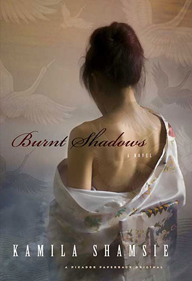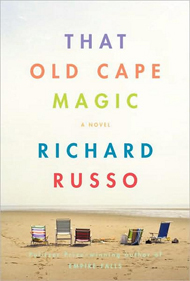-
March 12, 2010
Opening Round
-
Commentary by
Kevin Guilfoile & John Warner
-
Today’s Winner:
3Burnt Shadows
Kevin: Once again, I’ve read only one of the two books in this match, and once again that book has lost. I’m going to have even fewer intelligent things to say as this tourney goes on unless I get some serious help in the Zombie Round.
John: Don’t despair, my friend. There was a time, not too long ago, where we had no trouble filling our commentary quota despite being in states of total ignorance regarding the books at hand. Knowing something about what you’re talking about hardly matters in this day and age. Sherri Shepherd had her contract for The View extended and Liz Cheney is thinking about a Senate run.
Kevin: The college professor is to the literary novel what the serial killer is to the crime novel—a character archetype that most adult readers encounter far less frequently in real life than they do in fiction. And while I can provide a good argument for the utility of the serial killer in the context of a suspense novel—he provides both the instigating event (a gruesome murder) and the threat the hero must stop (lots more gruesome murders)—the only reason college professors exist in literary fiction is that college professors write so much of it. And once you have chosen a college professor as your main character, there would seem to be limits (outside the Indiana Jones/Robert Langdon multiverse anyway) on the number of very interesting things you can make him do, which is why a college professor in a literary novel will almost invariably start cheating on his or her spouse. I’m not sure about real life, but college professors get more side action in novels than Tiger Woods’s avatar (“Tag Heuer,” cha-ching!) in a Second Life disco.
This is nothing against Russo, whom I like, and whose work has always been sort of semi-autobiographical. I’m not suggesting he should stop writing about college professors any more than John Sandford should stop writing about serial killers. My point—and Judge Brown does a nice job of setting this argument up—is that we (and by we I mean bookstores) often divide books into two categories: literary fiction and genre fiction. But literary fiction is subdivided into hundreds of little genres that have their own crutches and clichés the same way crime novels do. For me, the best novels of any sort are the ones that are self aware. Their authors recognize the tradition in which they are writing and seek to subvert the readers’ own expectations in order to surprise them.
John: As the Twilight series is to 14- to 45-year-old girls, the “campus novel” is to me, which is to say, if the choice is Team Jacob or Team Edward, I choose Team Russo. That Old Cape Magic is actually Russo’s second book with a college professor protagonist, the first being Straight Man, which is a much more traditional campus satire in the vein of Kingsley Amis’s Lucky Jim. (That Old Cape Magic spends almost all of its time off campus.) Straight Man is a better book, in my opinion, mostly because it spends most of its time lampooning the various types one might find in an English department, but I enjoyed That Old Cape Magic quite a bit. But then when I look at some of my favorite books of all time, the list is studded with books with writers and/or academics as protagonists. In addition to the aforementioned Lucky Jim and Straight Man, there’s James Hynes’s The Lecturer’s Tale, Michael Chabon’s Wonder Boys, and John Irving’s The Water-Method Man, and The World According to Garp on the list. Throw in A Fan’s Notes and The Sportswriter for good measure, (though they may be a stretch), and you’re looking at something like 30 percent of my top 20 falling into this particular genre.
I’ve just started reading Sam Lipsyte’s The Ask, and it’s set at a “mediocre university” in New York, and I’ve already woken up my wife by laughing too hard while reading in bed. It’s headed for the list for sure.
Not surprising, really. I’m a nearing-middle-aged college teacher and writer. I’m a white guy 10 pounds heavier than I’d wish. This is my tribe. When I see them on the page, I think, I know them, and in return, I imagine that they know me.
Kevin: I realize now that in my haste to make a probably obvious point about the casual ways in which we classify and prejudge books, I neglected to mention that I really liked That Old Cape Magic. Russo’s writing is effortless, as you’d expect, and contains a great deal of humor and truth. By calling it genre I certainly didn’t mean to suggest it wasn’t good. My own first novel was about a doctor who clones his daughter’s unknown killer, and my second involves a civil war fought among the modern-day disciples of a religious cult founded by Pythagoras. I almost named my first son “Genre.” Even now I’m imaging a section of shelves in Barnes & Noble labeled “Campus Novels” with all of those great books you mentioned on it. It’s right next to the shelf labeled, “First Novels by New Yorkers About New Yorkers Writing First Novels (And Looking for Love).”
John: Maybe Nic Brown is right and Kamila Shamsie deserves the nod because of Burnt Shadows’s “scope and prose,” but I had a different reaction, which is that it’s the only book of the tourney that was an outright turkey. The entire plot is preposterous, somehow managing to shoehorn several generations of a truly international family into pivotal historical events that also happen to reflect themes of colonialism and white privilege. It’s not that a young Japanese survivor of the atomic bombing of Nagasaki couldn’t make her way to colonial India, where she meets and falls in love with the native servant of a privileged British couple, it’s just that there’s nothing on the page that made me believe these two somehow fell in love for any reason except that the author needed these two characters to intertwine to later be able to make some kind of political point. I’m sympathetic to the message of the book, but I would’ve preferred it in essay format, rather than something masquerading as a novel.
And for all that nice prose, that didactic dialog made me want to throw the book out the window, which would have been expensive, because I was reading it on my Kindle. The marionette strings extending from author to characters are thick as rope. At one point one character actually says to the other, “Dammit man, you should have known better than to stand watching a woman while she undresses.”
This character was not Leonard “Bones” McCoy and he was not saying it to James T. Kirk.
So, yeah, That Old Cape Magic doesn’t do a heck of a lot to revivify some of the well-worn tropes of its genre, and a book covering the midlife crisis of a privileged white male is about as original as writing about vampires and werewolves with six-pack abs, but at least no one said, “dammit man.”
Kevin: Once again, we both called this one wrong. We each had That Old Cape Magic ranked above Burnt Shadows, but I had Burnt Shadows finishing higher than you did. In our two-man confidence pool, my lead increases just a bit, to 37-29.
Kevin Guilfoile is a contributing writer for TMN. His debut novel, Cast of Shadows, has been translated into more than 17 languages, and his second novel, The Thousand, will be published in August 2010 by Alfred A. Knopf.
John Warner is a contributing writer for TMN. He is the author of Fondling Your Muse: Infallible Advice From a Published Author to the Writerly Aspirant. He teaches at Clemson University.

















